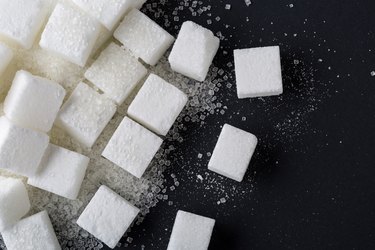
Ever wonder why nutritionists worldwide recommend limiting sugar? After all, the calories in sugar fuel your energy, no matter how tired you are. Unfortunately, this popular ingredient also fuels the obesity epidemic as well as diabetes, depression and heart disease.
Tip
One gram of sugar has 4 calories and no nutritional value. This applies to all types of sugars, including brown sugar and powdered sugar.
Video of the Day
Where Is Sugar Hiding?
Sugar consumption has reached a whopping 152 pounds per capita per year, as reported by the New Hampshire Department of Health and Human Services. That's about 3 pounds of sugar per person on a weekly basis. The American Heart Association recommends no more than 25 grams per day for women and 36 grams per day for men.
Video of the Day
These numbers show that Americans love sugar, despite the warnings issued by health organizations. Avoiding this sneaky ingredient isn't easy. Yogurt, diet cookies, cereals, fruit juices, protein bars and other seemingly healthy foods are often loaded with sugar in one form or another. Furthermore, manufacturers promote coconut sugar, brown sugar and molasses as being healthy and nutritious. Nothing could be further from the truth.
You see, this sneaky ingredient comes in many forms. There is malt sugar, invert sugar, corn syrup, fructose, sucrose, fruit juice concentrate, dextrose and more. Additionally, fruits and dairy products contain natural sugars, such as fructose and lactose, points out the American Heart Association.
Take cereals, for example. According to the USDA, this breakfast staple boasts up to 28 grams of sugar per serving, depending on the brand. Whole grains, on the other hand, don't exceed 14.6 grams of sugar per serving. A half-cup of oatmeal, or one serving, has only 0.3 grams of sugar.
Calories in Sugar
This popular ingredient provides nothing but empty calories. According to the American Heart Association, there are 4 calories in each gram of sugar. This applies to all varieties, including but not limited to brown sugar, turbinado sugar, powdered sugar and granulated sugar, not just table sugar. These products do contain small doses of vitamins and minerals, but too little to make a difference.
Brown sugar, for example, is marketed as a more nutritious alternative to its refined counterpart. Proponents say that it's rich in minerals and other trace elements that support overall health.
Unfortunately, that's just a myth. One teaspoon provides 17 calories, 4.5 grams of sugar, no protein and small amounts of minerals like calcium, magnesium and potassium — 0 percent of the daily recommended intake.
The Dietary Guidelines for Americans recommend consuming no more than 10 percent of your daily calories from added sugar. This means that if your diet provides 1,500 calories per day, your sugar intake shouldn't exceed 37.5 grams or 9 teaspoons daily.
Not All Calories Are Equal
While it's true that the calories in protein and carbs are the same as those found in sugar, their nutritional value makes all the difference. Remember, not all calories are created equal.
One gram of protein supplies 4 calories — just like added sugar. This nutrient, though, supports immune function, helps build and maintain cells and tissues, promotes muscle growth and facilitates fat loss.
Added sugar is a type of carbohydrate, but not all carbs are added sugars. Complex carbohydrates, for example, are slowly released into the bloodstream and provide steady energy throughout the day.
Read more: 16 Diet-Friendly Healthful Carbs
Simple carbs, including added sugars, are quickly digested, causing blood glucose spikes followed by crashes. Over time, they may increase your risk of diabetes, obesity and cardiovascular problems, warns Harvard Health Publishing. Both simple and complex carbs deliver 4 calories per gram.
Cutting down on added sugars is one of the best things you can do for your health. Swap this sneaky ingredient for stevia, a natural sweetener, or spices like cinnamon and vanilla. Make a habit out of checking the food labels and watch out for hidden sugars. Recreate your favorite desserts using healthier ingredients, such as raw cocoa instead of milk chocolate and unsweetened, dried fruit or applesauce instead of added sugar.
- Scientific Reports: "Sugar Intake From Sweet Food and Beverages, Common Mental Disorder and Depression: Prospective Findings From the Whitehall II Study"
- New Hampshire Department of Health and Human Services: "How Much Sugar Do You Eat? You May Be Surprised!"
- American Heart Association: "Added Sugars"
- American Heart Association: "Sugar 101"
- USDA: "200 Breakfast Cereals Highest in Sugar"
- USDA: "Grains and Pasta Highest in Sugar"
- USDA: "Cooked Oatmeal"
- USDA: "Nutrition Comparison of Sugar Turbinado, Sugars Powdered, Sugars Brown and Sugars Granulated"
- USDA: "Brown Sugar"
- Health.gov: "2015-2020 Dietary Guidelines for Americans"
- USDA: "How Many Calories Are in One Gram of Fat, Carbohydrate, or Protein?"
- NIH: "What Are Proteins and What Do They Do?"
- American Council on Exercise: "9 Things to Know About How the Body Uses Protein to Repair Muscle Tissue"
- British Journal of Nutrition: "Dietary Protein – Its Role in Satiety, Energetics, Weight Loss and Health"
- American Heart Association: "Carbohydrates"
- Harvard.edu: "The Sweet Danger of Sugar"